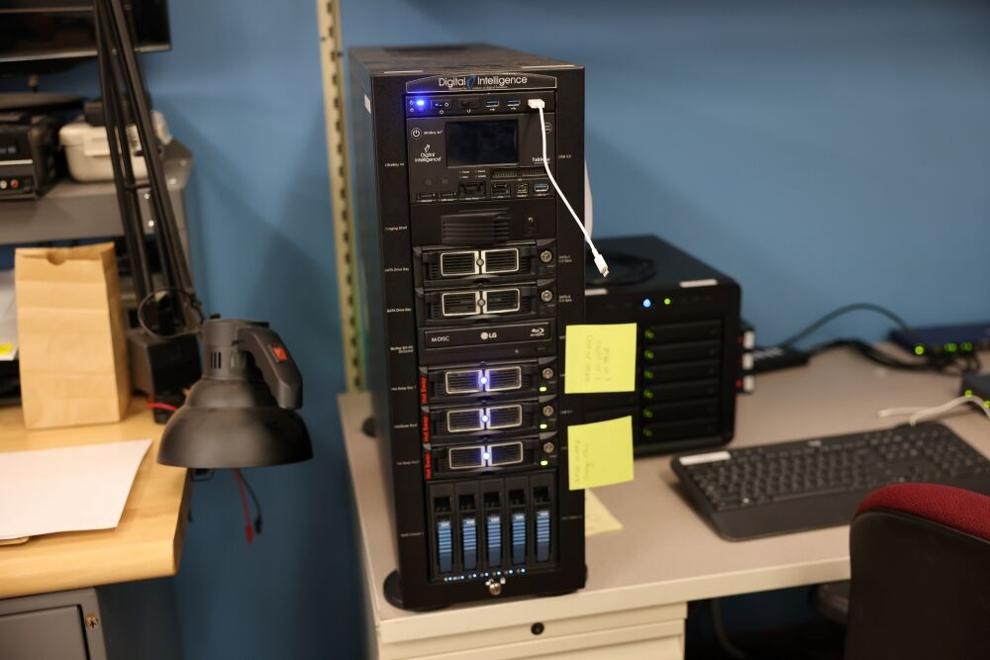Annie Pulley
 |
The Racine County Sheriff's Office seal as posted on a wall in its offices located at 717 Wisconsin Ave. in Racine. |
 |
"I want to get these people off the streets," said Anthony LaCombe, one of the RCSO's Internet Crimes Against Children Task Force investigators. |
"There's definitely an uptick for the Racine County Sheriff's Office," RCSO Public Information Officer Lt. Michael Luell said.
The increased number of arrests suggests multiple causes. The internet, social media and other digital channels makes the illegal material easier to access, and electronic service providers, such as Google, Facebook and Microsoft, are required to report suspicious activity.
The county is also funneling resources toward these cases, which has an effect on the number of arrests made.
Law enforcement agencies across the county investigate child pornography cases. For many of these departments, however, the investigators assigned to these cases also are working other types of cases.
In the sheriff's office, an entire team is focused solely on the investigation of child pornography cases.
RCSO's Internet Crimes Against Children Task Force is made up of two full-time investigators, Anthony LaCombe and Emil Ortiz, one computer analyst, Madeline Churches, and one electronics detection K-9, Stella.
The group is one of about 312 state affiliates of Wisconsin's ICAC Task Force, which is administered by the state Department of Justice's Division of Criminal Investigation.
Often, investigations begin with a cyber tip from the National Center of Missing and Exploited Children, or NCMEC.
When Google, Snapchat or another provider flag activity related to the download or distribution of child pornography, they report the activity to NCMEC. The center then finds the IP address of the user, tracing it to the state of origin.
If the illegal activity occurred in Wisconsin, NCMEC would send the tip to the state DOJ. The DOJ's Division of Criminal Investigation then assigns the tip to the appropriate local jurisdiction.
This all has to happen before LaCombe and Ortiz can begin their investigation.
"That's a big process," LaCombe said.
In 2023, NCMEC, a nonprofit, received 36.2 million reports of suspected child sexual exploitation online, according to its website. Reports of online enticement increased by more than 300% between 2021 and 2023.
"Every year," LaCombe said, "it is going up dramatically."
Timeliness is often a factor of how quickly electronic service providers respond to subpoenas or warrants after LaCombe and Ortiz begin their investigation.
In order to search a user's Microsoft or Apple account for additional evidence, they need cooperation from the electronic service provider.
Google, they explained, can take between three and six months to respond to a warrant. Some companies, such as WhatsApp, are not based in the United States, which can further slow the process.
After receiving access to a suspect's account or files, their analyst must sort through masses of content to determine what's evidence and what's irrelevant to the investigation.
In some cases, a suspect might no longer be in the county. In many of these cases, the investigators will transfer their evidence and progress to the appropriate authority.
According to LaCombe, a case was transferred to the U.S. military because the suspect was actively deployed.
LaCombe and Ortiz also manage a complex computer system in which several machines constantly scan the web for child sexual abuse material. There are about 400 million known images that NCMEC has previously flagged; this system will automatically flag activity that includes recycled imagery.
 |
One of several computers used by ICAC investigators Anthony LaCombe and Emil Ortiz to constantly scour the internet for recycled child pornography. |
Luell likened these investigations to a "space race."
The technology used to attain and distribute illegal material is constantly evolving, meaning that investigators' technology and approaches must also constantly evolve.
Beyond having a strong command of their relevant computer systems, legal procedure and search and arrest tactics, these investigators must also be psychologically evaluated every six months due to the nature of their investigations, Luell said.
"I don't know that there's people out there that could mentally handle a lot of the things that we see," Ortiz said. "We're not desensitized to stuff, but we have a job to do ... We do have compassion. We care about the community, care about serving and protecting."
When it's time to execute a search warrant, K-9 Stella is essential.
According to Ortiz, people who view child pornography are often very adept at organizing and hiding the content. Investigators have even found SD cards hidden in fake coins.
 |
Stella is an English Black Lab specially trained in electronics detection. She is an invaluable member of the Sheriff's Internet Crimes Against Children Task Force. |
Stella, a 2-year-old English black lab, is trained to detect a chemical present in the electronic devices routinely used to store child pornography.
Stella also is a therapy dog.
According to LaCombe, Stella is a comfort to victims and to the entire task force.
She takes "your mind off of stuff and kind of gives you a break," LaCombe said.
Speaking on behalf of Sheriff Christopher Schmaling, Luell said that these children are "horrifically traumatized and sexually abused in the creation of child porn, but they're also revictimized when people upload, download and view this."
As this strand of criminality receives more attention, the very vernacular is changing. Advocates and prosecutors have adopted the term child sexual abuse material versus child pornography, to reflect the underlying abuse behind every image.
"We're able to protect kids, protect our community, give children justice," LaCombe said. "It's probably the most rewarding law enforcement job I've ever had."






No comments:
Post a Comment